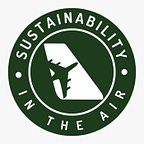In this episode of our ‘Sustainability in the Air’ podcast, Dave Kettner, President and General Counsel at Virent, speaks with SimpliFlying CEO Shashank Nigam about the company’s innovative contributions in the field of renewable fuels and chemicals and its pivotal role in shaping a sustainable future in aviation.
Kettner emphasises their breakthroughs in renewable fuels, particularly their BioForming® process that converts plant carbohydrates into bioformate, a green alternative to petroleum products. This process is used to create sustainable aviation fuel (SAF) and materials for various industries, marking a shift to plant-based resources.
Here are the key highlights of the conversation:
Virent's unique BioForming process (2:20)
Virgin Atlantic’s 100% Sustainable Aviation Fuel flight (9:00)
Why demonstration flights are important (17:10)
Virent’s evolution and focus on 100% bio-based products (22:00)
Specialisation in aviation aromatics (25:20)
Global licensing and expansion strategy (27:20)
Vision for the future of sustainable aviation (29:50)
Rapid Fire! (33:05)
Keep reading for a quick overview of the episode.
Why Virent’s BioForming process matters
Kettner clarifies a common misconception about their process, stating that it does not involve direct air capture or e-fuels. Instead, Virent capitalises on the natural carbon-capturing ability of plants.
A significant portion of a plant (55-85%) is made up of sugars, which they extract and convert into fuels and chemicals. This method is analogous to the natural geological processes that create oil, but Virent’s technology accelerates this to a matter of minutes rather than millennia.
The company's technology is versatile, allowing the utilisation of sugars from a diverse array of sources, including woody biomass, agricultural residues, and various energy crops. This flexibility is a key advantage, enabling the use of different parts of the plant, whether it's waste material or the plant itself, thus maximising resource utilisation.
5 ways Virent is envisioning the future of sustainable aviation
1. Virgin Atlantic’s historic 100% SAF trans-atlantic flight
On November 28, Virgin Atlantic successfully completed a transatlantic flight from London to New York using 100% SAF, marking a first for a commercial airline. Although Gulfstream Aerospace had recently achieved a similar feat with a business jet, Virgin's flight to JFK airport is being hailed as a historic milestone.
Virent was a key partner in making the flight possible, their unique contribution being a clean-burning aromatic component essential for jet fuel – also known as Synthesized Aromatic Kerosene (SAK). This component, combined with BP's paraffinic component, forms a sustainable jet fuel that has the potential to reduce particulate matter emissions and contrails.
Kettner also discusses the logistics involved in this project. The fuel component produced in Wisconsin was shipped to the UK, where it was combined with BP's fuel. The selection of transportation methods was made with carbon footprint considerations in mind, opting for marine vessels and rail to ensure lower carbon emissions compared to alternatives.
The demonstration flight aims to showcase the practicality of 100% SAF as a direct replacement for regular jet fuel, without necessitating changes in aircraft performance or infrastructure. Moreover, such flights are also crucial for gathering the necessary data for the ASTM approval process, which will pave the way for broader commercial use of the fuel.
2. Specialisation in aromatics for aviation
Virent's unique positioning in the market is focused on the production of aromatics, crucial in the quality of gasoline and jet fuel, as well as being fundamental to the polymers industry.
Kettner details how Virent’s technology not only produces aromatics but does so in a way that is cleaner and more efficient than traditional methods. This capability is especially significant in the context of the aviation industry, where there is a critical need for sustainable and efficient fuel solutions.
Explainer: Aviation fuel primarily comprises two chemical compounds: 75% to 90% aliphatic molecules, similar to those in diesel fuels, featuring long chains of carbon atoms, and 10% to 25% aromatic molecules, characterised by at least one ring of six connected carbon atoms. In transportation fuels, aromatic hydrocarbons are usually removed to reduce pollution. However, in aviation fuels, aromatics are essential as they define the fuel's physical and combustion properties and ensure the tightness of seals in aircraft fuel systems. Thus, while necessary, aromatics pose a challenge in developing sustainable aviation fuels.
3. Evolution, adaptability and focus on 100% bio-based products
Reflecting on his long tenure at Virent, Kettner discusses the company's evolution, mirroring the shifting focus within the renewable energy sector.
Initially centred around hydrogen technology, Virent pivoted towards biofuels and has now embraced sustainable aviation fuel as a key area of focus. This adaptability is exemplified by their ability to modify their technology to produce different products as market demands change, without needing to overhaul their core processes.
Kettner shares examples of their successful collaborations, producing 100% bio-based consumer products, which illustrates the potential of their technology in various applications beyond aviation as well. Virent has recently contributed to the development of 100% bio-based products, such as Patagonia's Sugar Down Hoodie and Issey Miyake's fashion items. Additionally, in collaboration with Coca-Cola, Virent has helped create a fully recyclable, bio-based Coke bottle, nearly indistinguishable from regular bottles.
“The winds have changed, and things have shifted; now sustainable aviation fuel is big. The fortunate thing for us is we don't need to change our technology. We just take a different cut of the product on the back end, and we move it into sustainable aviation fuel.”
4. Global licensing and expansion strategy
In discussing Virent’s strategy for growth, Kettner outlines their plan to build their first commercial plant, marking a significant step towards large-scale SAF production.
In addition to constructing their own facilities, Virent also aims to license their technology globally, leveraging a partnership with Johnson Matthey. This approach is designed to enable the adaptation of their technology in different regions of the world, tailored to local feedstock availability. By licensing their technology, Virent seeks to facilitate the widespread adoption of sustainable fuel and chemical production practices.
"We believe our technology fits well globally, depending on the available feedstock. For instance, in South America, it can utilise the abundant sugarcane, or in Asia, it can work with cassava plants and sugarcane. Our technology can be implemented in these regions to produce fuels and chemicals. In Europe, it can adapt to sugar beets, woody biomass, and agricultural residues – diverse feedstocks, but the same technology."
5. Advocating for drop-in SAF solutions
Kettner strongly advocates for the development of drop-in SAF compatible with existing infrastructure and aircraft. He emphasises the importance of this approach in avoiding the complications of introducing new fuel systems or modifying current aircraft, thus ensuring a smooth and safe transition to SAF.
The Virgin Atlantic flight is cited as a critical example, demonstrating the practicality of SAF in real-world conditions. Kettner also underscores the necessity for continued work in policy formulation and industry collaboration to fully harness the potential of SAF.
Aviation plays a critical role in connecting the global economy, overcoming geographical barriers, and enabling international commerce and communication. According to Kettner, SAF is a natural progression in the industry's evolution and is essential for meeting the energy demands of long-distance travel.
"There's a limit to what can be achieved with new technologies like solar or hydrogen, especially for long-distance travel of products and people. The real alternative is replacing petroleum-based jet fuel with sustainable aviation fuel. The challenge is to do this sensibly. Considering planes fly worldwide to various airports, it's crucial not to create a new fuel system with two different fuels."
‘Sustainability in the Air’ is the world’s leading podcast dedicated to sustainable aviation. Through in-depth conversations with top aviation leaders, we break through the clutter and provide a clear roadmap for a net-zero future.
















